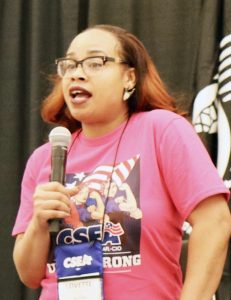Editor’s Note: During the recent CSEA’s Women’s Conference, several union activists told stories of their union journey during the plenary “Our Voice, Our Power” sessions.

Mootry
A fourth generation New York state employee and third generation CSEA local president, Buffalo Psychiatric Center Local President Lovette Mootry was initially unsure whether she was cut out for union leadership.
She soon found her voice – and found herself facing numerous challenges that included an understaffed workforce and mandatory overtime, which could range from 15 minutes to a full eight-hour shift.
When the pandemic began, the challenges grew greater.
“When COVID happened, we still had to come to work,” said Mootry. “Our workforce had slimmed down so much that people were mandated 4-5 times per week. If you came to work, you were stuck there.”
This frequent mandatory overtime led to even greater staff shortages and stress.
“People would just give back their keys and say ‘this is too much for me,’”said Mootry. “I can’t blame anybody when you come to work to take care of your family and you can’t even go home to see your family.”
Mootry began to discuss alternative work shifts with management, an idea that had been discussed before the pandemic but not put into action.
In January, the center began these shifts for mental health therapy aides. Under the plan, employees work 12-hour shifts three or four days per week and an eight-hour shift every other week. Mootry also worked with center management to help recruit new workers.
“We knew we had to make some changes,” said Mootry. “With that, we did open, group interviews, started advertising for jobs (with billboards) and even commercials.”
With the new schedules and hiring, Mootry said worker complaints about mandatory overtime have dwindled.
“We went from our workers being unable to take time off to them actually being able to take a vacation, so we have drastically changed people’s lives,” said Mootry.



